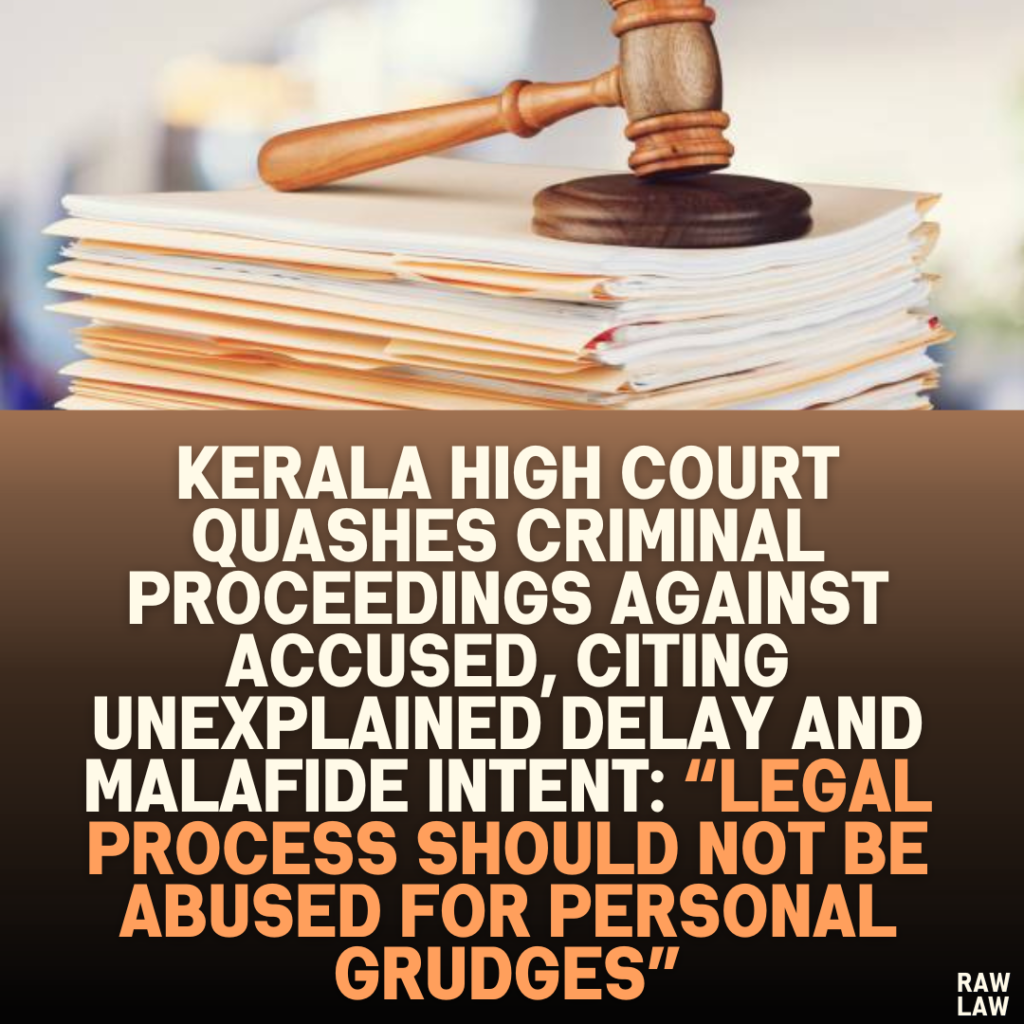Court’s Decision
The Kerala High Court quashed the criminal proceedings against the petitioner and her family members in relation to an alleged assault incident dated December 27, 2015. The Court found the delay in lodging the FIR to be unexplained, calling it “an afterthought” motivated by malafide intent to harass the accused. The High Court exercised its inherent powers under Section 482 of the Code of Criminal Procedure, considering the proceedings an abuse of the court’s process.
Facts
The case originated from an alleged incident in which the petitioner and her family members were accused of criminal trespass, assault, and intimidation toward the mother-in-law of the petitioner’s daughter. The allegations stated that on December 27, 2015, the petitioner and her family forcibly entered the de facto complainant’s residence, leading to an altercation. The FIR was only filed on June 23, 2016, six months after the alleged incident, with no convincing reason provided for the delay. The petitioner and her family argued that they were in Mumbai during the time of the alleged incident, preparing for a family wedding.
Issues
The primary issues were:
- Whether the delay in filing the FIR compromised the authenticity of the allegations.
- Whether the criminal proceedings were being used to settle personal grievances and harass the petitioner and her family.
Petitioner’s Arguments
The petitioner argued that the delay in filing the FIR indicated a lack of credibility and malafide intent on the part of the complainant. They highlighted multiple legal disputes ongoing between the families and claimed that the complainant had retained the daughter’s gold ornaments and car, using the proceedings to exert pressure. Additionally, they argued that the petitioner and her family were not present at the alleged crime scene on December 27, 2015, and presented documents as evidence of their presence in Mumbai.
Respondent’s Arguments
The respondents contended that the allegations were genuine and should be evaluated through a trial. They argued that the delay in reporting the incident was due to social considerations, as the complainant felt embarrassed to report the incident earlier. They also disputed the authenticity of the petitioner’s evidence proving their presence in Mumbai on the alleged date, suggesting these could be fabricated.
Analysis of the Law
The Court acknowledged that delay in lodging an FIR does not automatically invalidate a complaint but can be a factor when it indicates potential malafide intent. The Court referred to various precedents, including Kishan Singh v. Gurpal Singh and Satpal Singh v. State of Haryana, which highlighted that unexplained delays could allow courts to question the intent behind filing criminal complaints.
Precedent Analysis
The Court cited the Supreme Court’s stance in Bhajan Lal v. State of Haryana, where malafide intent and abuse of the judicial process justify quashing proceedings. The Court also referred to recent Kerala High Court rulings and other judgments that reaffirmed the role of High Courts in protecting individuals from vindictive legal actions intended to misuse criminal law.
Court’s Reasoning
The Court found that the complainant’s explanation for the delay was implausible, as both parties were involved in extensive legal disputes. The Court reasoned that this unexplained delay, coupled with the history of animosity, indicated that the proceedings were a means of harassment. It further noted that the complainant’s failure to appeal the dismissal of a similar domestic violence case earlier added weight to the petitioner’s argument of malafide intent.
Conclusion
The Court concluded that the criminal complaint lacked genuine intent and appeared to be motivated by malafide intentions. It quashed the proceedings, declaring that the legal process should not be misused for personal vendettas.
Implications
The judgment reinforces the principle that criminal law should not be employed as a means to settle personal scores. It underscores the High Court’s role in identifying and quashing cases where legal processes are being used as tools of harassment. This case highlights the necessity for credible explanations in delayed complaints and the Court’s discretion in preventing abuse of judicial mechanisms.




Pingback: Madurai Bench of Madras High Court Dismisses Writ Appeal in Document Registration Dispute, Emphasizes "Writ Jurisdiction Not a Substitute for Statutory or Civil Remedies; Effective Alternative Remedy Available Through Civil Court" - Raw Law